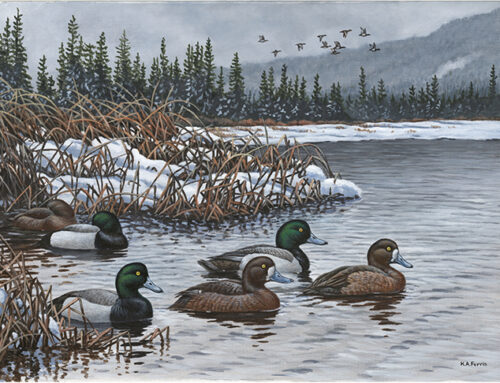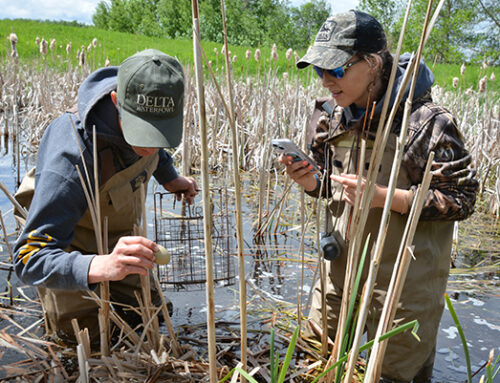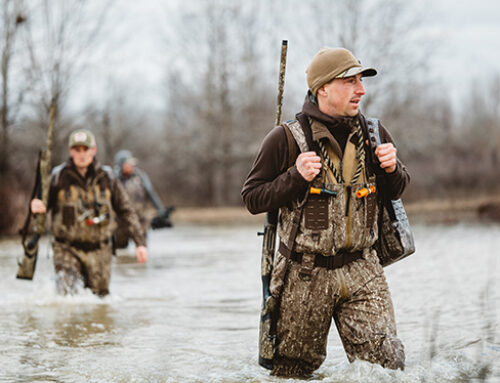Delta Collaborates on Priority Items for Transition to New Administration; Potential New WMA in Utah; Updates on West Coast Firearms Legislation

Vigorous Duck Production, HunteR3, and other Delta-supported efforts continue across the United States and Canada
United States
Federal
- New Administration Transition Documents Sent: As is customary in the transition between administrations, “landing teams” from the new administration work to ensure smooth transitions as political appointees are undergoing the nomination process. This marks a key moment when policy staff review input and begin to chart a future course with the new team in place.Delta worked with conservation partners to develop and submit a list of priority items to the landing teams at both the Department of the Interior and the Department of Agriculture on key issues important to ducks and duck hunters. Items addressed to the Interior included the ailing state of our National Wildlife Refuges, the need for investment in ongoing monitoring programs critical for management of ducks and geese—including annual surveys and banding—as well as the opportunity for increased waterfowl hunting opportunities. In the submission to USDA, the partners recommended a significant increase in the Migratory Bird Resurgence Initiative to conserve small prairie wetlands as other habitat in key wintering areas, maintain robust CRP acres, and ensure the future of VPA-HIP, which incentivizes landowners to increase public access.These submissions are the starting point for initial discussions with the Administration about how their actions can significantly improve conditions for ducks and duck hunters.
- Delta’s John Devney Named 2025 Chairman of the American Wildlife Conservation Partners: John Devney, chief policy officer for The Duck Hunters Organization, has been named as the 2025 Chairman of the American Wildlife Conservation Partners. AWCP is a coalition of the country’s 52 leading sporting-conservation organizations representing hunter-conservationists, wildlife professionals, outdoor enthusiasts, conservation educators, and scientists.In September 2024, AWCP unveiled Wildlife for the 21st Century, Volume VII (W-21). This guiding document details key strategies to conserve wildlife and habitat nationwide, enhance public access, and safeguard our outdoor traditions. Delta Waterfowl was a proud representative of ducks and duck hunters in the collaborative efforts. Read more about AWCP and Devney’s appointment here.
State
Maryland
- Canada Goose Limits: Delta policy staff are closely watching a pair of bills, Senate Bill 335 and House Bill 892, that seek to alter the bag limits for Canada geese across the state throughout the various Resident Population and Atlantic Population zones. Specifically, these bills mandate the bag limit for Canada geese during the migratory hunting season in the state align with the annual bag limit set by the U.S. Fish and Wildlife Service under the Department of the Interior.
Connecticut
- Sunday Hunting: Delta is again monitoring and pushing for a suite of bills in Connecticut that seek to repeal the prohibition against hunting on Sundays within the state. Senate Bill 66, Senate Bill 79, House Bill 6227, House Bill 5132 and House Bill 5022 all have provisions in them that would allow for some expanded opportunities for hunters on Sundays. Delta’s policy staff will continue to advocate for these repeals throughout the Atlantic Flyway, both in the United States and Canada.
North Dakota
- Firearm Discharge: Delta policy staff recently submitted testimony in opposition to legislation in North Dakota that would prohibit individuals from hunting or pursuing game within 440 yards of any building, occupied structure, or storage structure without obtaining the consent of the property owner.Senate Bill 2168 would create a quarter-mile distance requirement for sportsmen and women to legally hunt on property they own or lease, essentially requiring citizens of North Dakota to have access to hundreds of contiguous acres to legally hunt, negatively impacting their ability to use their property as they choose.
- License Fee Increase: Delta also recently submitted testimony in support of legislation in North Dakota that will slightly increase the price of the suite of licenses, tags, and stamps offered by the North Dakota Game and Fish Department.House Bill 1470 will provide a modest, inflation-adjusted price increase of the suite of license fees that NDGF offers. This will allow NDGF to not only add roughly $5 million in funding each year but will also allow them to increase the amount of federal funds they receive with the current 3:1 match. The additional funding will go directly back into the core mission of the agency and allow them to better manage wildlife and their habitats, while providing additional access and opportunities for the sportsmen and women of North Dakota.
Virginia
- Free or Discounted License Reimbursement: In January, Delta submitted testimony in support of House Bill 2523, legislation that would require the General Assembly to reimburse the Department of Wildlife Resources any time they pass legislation to provide free or discounted hunting or fishing licenses in the state. When license fees are eliminated entirely through free or discounted licenses, states not only lose this federal funding component but also forfeit the original revenue from the license itself. This loss of funds can severely hinder the state’s ability to do necessary work on behalf of wildlife and hunters.
Minnesota
- Proposed Mine Operation on the Mississippi River: Delta Waterfowl submitted comments in January on a draft Environmental Impact Statement regarding the Nelson Mine Backwaters Project Study Area near Cottage Grove, Minnesota. The noise and disruption associated with mining operations could drive waterfowl away from the area and reduce hunting opportunity.Delta has highlighted the cultural and economic impacts waterfowl hunters have in the state and urged the town of Cottage Grove to take into consideration any impacts this proposed mine site would have on waterfowl or waterfowl hunters before proceeding.
Montana
- Increase Fee for Swan and Crane Tags: House Bill 146 is a noteworthy bill that will have longstanding positive effects on Montana wetlands and waterfowl.For decades, sportsmen and women have shown their willingness to fund state-based conservation programming through the sale of licenses, duck stamps, tags, permits, etc. The additional fees generated by HB 146 will go to support some of the state’s most critical habitat—wetlands. Wetlands ecosystems across Montana are impacted more than any other ecosystem in the state and are essential in providing more opportunities for wildlife and migrating waterfowl.
- Governor’s Tundra Swan Tag: House Bill 330 is an impactful piece of legislation that seeks to create a yearly lottery tag for antelopes and swans in Montana.Lottery tags—sometimes referred to as “Governor Tags”—are separate from the traditional Montana tagging system as they can be sold at auction to support conservation in the region. This style of tag generally receives more exposure from the greater hunting community at large. This higher level of exposure leads to more interest in state conservation, as well as higher levels of revenue generated through tag sales. The money generated through this auction is then used in a fund to support specific habitats related to these species.
Utah
- New Wildlife Management Area: Delta policy staff have been closely following House Bill 244—legislation that has the potential to increase public access for all Utah waterfowl hunters.House Bill 244 seeks to open a new Wildlife Management Area on the Great Salt Lake. The new WMA would be located on the northern side of the lake at a site called Bear River Bay. Delta’s team is currently working with the bill sponsor and stakeholders on the ground to ensure that the bill language includes a funding mechanism for this WMA, as funding is critical for this type of project and without it the new WMA will not be successful.
Oregon
- Rogue River Access: In January, the Oregon Marine Board debated placing 10-horsepower restrictions on boat motors for large sections of the Rogue River. Delta’s policy team sent multiple letters to the Marine Board expressing concerns over how these restrictions would limit waterfowl hunters’ ability to safely access and navigate this section of the river.Delta is happy to report that the Marine Board heard the concerns of hunters and opted not to place these restrictions on the section of the river that is hunted, guaranteeing continued access for Delta members and all waterfowlers that use the area.
- Minimum Age for Firearm Use: Senate Bill 697 seeks to prohibit a person under 21 years of age from possessing firearms. Delta Waterfowl’s main concern regarding this bill is how it will impact the hunting community.While SB 697 does include language suggesting that it will not affect sportsmen and women, the caveat is that any individual under the age of 21 can carry a firearm to hunt only if they are with a parent or guardian, preventing 18- to 20-year-olds from hunting on their own.
Washington
- Mandatory Firearms Training Course: In Washington, if an individual wants to buy, sell, or transfer a firearm, they must possess either a hunting license or prove that they have completed a firearm safety program. House Bill 1163 would require Washington gun owners to take an extensive firearm training course and pay a tax to receive a five-year permit to purchase firearms–even if they already own a hunting license. Delta is monitoring this situation.
- One Gun A Month Bill: House Bill 1132 seeks to limit the number of firearms and ammunition an individual can buy per month. It is important to note that the language found in this legislation is directly modeled from a California bill—Assembly Bill 1483—which was blocked by a 9th Circuit Court of Appeals in August of 2024. The 9th Circuit declared this legislation unconstitutional and a clear violation of the Second Amendment. Because of this ruling, it is clear that HB 1132 is also unconstitutional.Importantly, the language between these two bills is nearly identical, and their intent is the same. Delta feels that the 9th Circuit Court ruling clarifies the legality of “one gun a month” legislation, which Washington’s HB 1132 clearly violates.
- Firearm Liability Insurance Requirement: House Bill 1504 seeks to require all Washington gun owners to acquire $25,000 worth of insurance coverage per firearm they own. This legislation does not help to enhance public safety and only seeks to punish law-abiding duck hunters in the state.
- Gun Violence Prevention Excise Tax: House Bill 1386 seeks to add an additional 11% tax to the purchase of firearms and ammunition. This tax would then be placed into an intentionally loosely defined fund for gun violence protection. This tax would be in addition to the already 11% excise tax collected on firearms and ammunition under the Pittman-Robertson Act, with the difference being that the money generated through HB 1386 serves zero benefit to Washington’s wildlife or natural resources.
Oklahoma
- Guides and Outfitters: Delta’s policy staff have been working with lawmakers in Oklahoma to make recommendations on legislation that will update and modernize the suite of licenses, fees, and requirements associated with operating an outfitting or guiding business in the state.Senate Bill 208 would establish an annual fee of $1,000 for the license for residents and $2,000 for nonresidents. Applicants must demonstrate that they have a driver license, can provide lifesaving first aid and cardiopulmonary resuscitation, produce liability coverage equal to $1 million, and obtain written permission from the landowner and possess such document while hunting.
- Non-Resident Access on Public Lands: Delta has been watching several bills that have already been filed that seek to restrict non-residents’ access to hunting in Oklahoma.House Bill 1383 and Senate Bill 448 both seek to limit the ability of non-residents to access public lands to hunt waterfowl in the state in some capacity. While unclear if these bills will gain any traction, Delta’s policy staff has met with bill sponsors and will continue to monitor them throughout the 2025 session.
Kansas
- Habitat Management Tax Credit: Delta Waterfowl signed on to a letter of support—along with partners like Ducks Unlimited, National Deer Association, and Pheasants Forever—on House Bill 2097 in Kansas. This legislation would grant a tax break to private landowners who enroll their land in public access programs for hunting and fishing or who engage in certain habitat conservation and management practices.This legislation has the ability to provide more public access for sportsmen and women while incentivizing voluntary conservation practices that will benefit wildlife.
Mississippi
- Senate Bill 227: Delta policy staff recently attended a hearing in the Mississippi Senate Energy Committee on Senate Bill 2227, legislation that seeks to place a moratorium on all new wind energy development while the state can complete a study on the impacts that Industrial Wind Turbines (IWTs) have on agriculture practices and wildlife. In committee, the bill was amended to exclude the moratorium portion of the bill, but it eventually passed out of the committee where Delta will continue to monitor it.
Canada
Provincial
Ontario
- Discharge of Firearms By-law: Town of Mono: As reported in an earlier update, the Town of Mono has now moved forward and released a draft by-law to regulate the discharge of firearms and bows; bylaw number 2025-XX.With the draft having now been released, Delta Waterfowl seized the opportunity to travel to Mono and meet face-to-face with the staff responsible for this file to provide the organization’s initial feedback, suggestions, and recommendations. The meeting went positively, and Delta was asked to formulate a written letter to council highlighting each of the elements Delta had brought to attention.During the meeting, Delta’s team was told on more than one occasion that feedback from our organization would be impactful in this process. Based on the comments during the meeting, the town is not in any hurry to push this through without proper consultation and also mentioned that their rough timeline would be to have a finalized product by the fall.
- Discharge of Firearms By-law: Township of Ramara: Once again, there are some public safety concerns being expressed to members of council as they relate to duck hunting on Lake Simcoe. Early in February, Delta was contacted by a local council member wishing to discuss this matter and to ask for clarity regarding the existing rules and regulations about duck hunting on the lake. Although there have not been any recent deputations or letters to council calling for further restrictions, there is concern that there will be in the future.While Delta will continue to keep a close pulse on this issue from afar, Delta’s team has been assured that the organization would be contacted should something start to surface. During conversations, the organization’s policy staff reaffirmed their offer to appear before the council if and when necessary.
- Late Canada Goose Hunting Season: As previously reported, Delta Waterfowl has been leading the discussions to try and find viable solutions to secure a late Canada goose hunting season in municipalities who have adopted Sunday gun hunting—particularly those in southwestern Ontario—while staying within the maximum allowance of the 107 days.Despite the tremendous increase in access that Sunday gun hunting provides to hunters, it does come at a cost. Adding Sundays throughout the entirety of the hunting season utilizes ‘days’ that had been traditionally available for the late Canada goose hunting season that takes place through parts of February and March. As soon as a municipality approves Sunday gun hunting, the late Canada goose season is lost—a by-product of an initiative that was not likely an issue when Sunday gun hunting was first implemented back on Sept. 1, 2006.Delta believes it is possible to have both Sunday gun hunting and the late Canada goose hunting season, where applicable. Delta policy staff recently met with the Ontario Federation of Anglers and Hunters to provide an update on the issue, to provide them with a few possible and viable options for consideration and to seek their assistance as Delta attempts to resolve this issue.Delta will also be presenting these options at the next Ontario Waterfowl Advisory Committee meeting.
- Ontario Waterfowl Advisory Committee (OWAC): Delta has recently been informed that the spring OWAC meeting will be scheduled for the end of March; (the fall meeting was cancelled).Delta Waterfowl continues to lead the discussion on the possibility of securing a late Canada Goose hunting season in municipalities which have adopted Sunday gun hunting in select areas of southern Ontario, particularly southwestern Ontario. This topic and others will be a priority at the spring meeting.
Do you want to stay involved with issues that are threatening the future of waterfowl hunting? Now is the time to make your voice heard by registering for Delta Waterfowl’s Duck Hunters Action Alert System. Delta Waterfowl’s policy team will send you emails and alerts when issues that impact you arise and provide you with the tools and resources to engage with lawmakers. Text DELTA WATERFOWL to 52886 or click this link today to sign up!






Leave A Comment